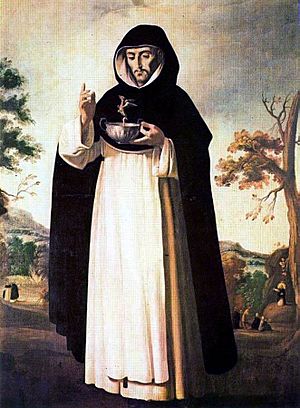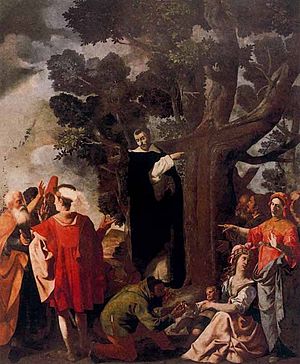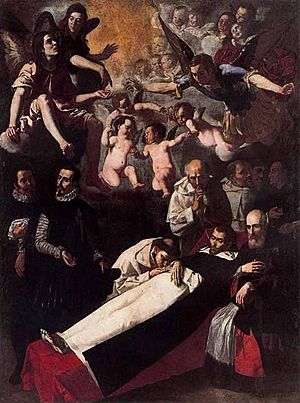Louis Bertrand (saint) facts for kids
Quick facts for kids SaintLouis Bertrand O.P. |
|
|---|---|

Spanish Baroque Oil painting of Louis Bertrand by Francisco de Zurbarán
|
|
| "Apostle of South America", priest, missionary, confessor | |
| Born | 1 January 1526 Valencia, Spain |
| Died | 9 October 1581 (aged 55) Valencia, Spain |
| Venerated in | Roman Catholic Church |
| Beatified | 19 July 1608, Saint Peter's Basilica, Papal States by Pope Paul V |
| Canonized | 12 April 1671, Saint Peter's Basilica, Papal States by Pope Clement X |
| Major shrine | Saint Peter's Basilica, Vatican City |
| Feast | 9 October |
| Attributes | A chalice containing a snake |
| Patronage | Buñol; New Granada; Colombia |
Saint Louis Bertrand (born January 1, 1526 – died October 9, 1581) was a Spanish Dominican friar. He was a priest and a missionary who traveled to South America in the 1500s. He is often called the "Apostle of South America" because of his important work there. The Catholic Church honors him as a saint.
Contents
Early Life in Spain
Louis Bertrand was born in Valencia, Spain. His parents were Juan Bertrand and Juana Angela Exarch. He was related to another famous saint, Vincent Ferrer, who was also a Dominican.
From a young age, Louis wanted to become a Dominican friar. Even though his father tried to change his mind, Louis joined the Dominican order. He started his training at the Convent of St. Dominic in Valencia on August 26, 1544. After his training, he made his promises to the order.
Louis was a serious person, but he was also kind and gentle. People liked him very much. He worked hard at his studies, even though he didn't think he was very smart. In 1547, he became a priest.
He became a "master of novices" at the Valencia convent. This meant he taught new friars. He did this job for about 30 years at different times.
Helping During the Plague
In 1557, a terrible sickness called the plague spread in Valencia. Louis bravely helped the sick and dying. He even prepared the dead for burial and buried them himself.
After the plague ended, Louis wanted to do even more to help people. He became a preacher. People said his voice wasn't great and he sometimes forgot things, but he was a very strong and passionate speaker. So many people wanted to hear him that he had to preach in the city squares because churches were too small.
Louis had always dreamed of becoming a missionary in the New World (the Americas). In 1562, he got permission to go. He sailed to America and arrived in Cartagena, where he immediately began his missionary work.
Missionary Work in South America
It is believed that Louis Bertrand could perform miracles. People also said that when he preached in Spanish, people who spoke different languages could understand him. He stood up for the rights of the native people against the Spanish conquerors. He was encouraged by Bartolomé de las Casas, who also defended the natives.
Converting Many People
From Cartagena, Louis went to Panama. In a short time, he helped about 6,000 people become Christians. His next mission was in Tubará, a town near the coast. Records show that all the people in Tubará became Christians because of his efforts. Some say he converted 10,000 people there.
After Tubará, Louis went to other places like Cipacoa and Paluato. He had great success in Cipacoa. In Paluato, his work was harder. From there, he went to the province of Santa Marta, where he helped 15,000 people become Christians. While he was in Santa Marta, 1,500 people from Paluato came to him to be baptized, even though they had refused before.
Louis then tried to convert the Caribs, a warlike group of people. His work with them was not as successful.
Surviving Poison
A story says that a native priest tried to poison Louis Bertrand. But because of God's help, the poison did not harm him.
Louis also visited Tenerife in the Canary Islands and Mompax, where many thousands of people became Christians. He also visited several islands in the West Indies, like St. Vincent and St. Thomas.
Return to Spain
After seven years as a missionary in South America, Louis Bertrand returned to Spain in 1569. He wanted to speak up for the native people who were being treated unfairly. He was not allowed to go back to work among them.
He used his growing reputation as a holy man, and his family connections, to help the native people he had met. He also continued to serve in his home area of Valencia. Many people came to him for spiritual advice, including Saint Teresa of Ávila.
In 1580, Louis Bertrand became ill. He died on October 9, 1581, just as he had predicted. He is often called the "Apostle of South America" for all his important work.
Veneration
Louis Bertrand was made a saint by Pope Clement X in 1671. His feast day is celebrated on October 9.
There is a statue of Saint Louis Bertrand on the north side of St. Peter's Basilica in Rome.
The famous festival called La Tomatina in Buñol, Valencia, honors Louis Bertrand and the Mare de Déu dels Desemparats (Mother of God of the Defenseless), a title for the Virgin Mary.
See also
- List of Colombian saints
- In Spanish: Luis Bertrán para niños
Images for kids
 | DeHart Hubbard |
 | Wilma Rudolph |
 | Jesse Owens |
 | Jackie Joyner-Kersee |
 | Major Taylor |





